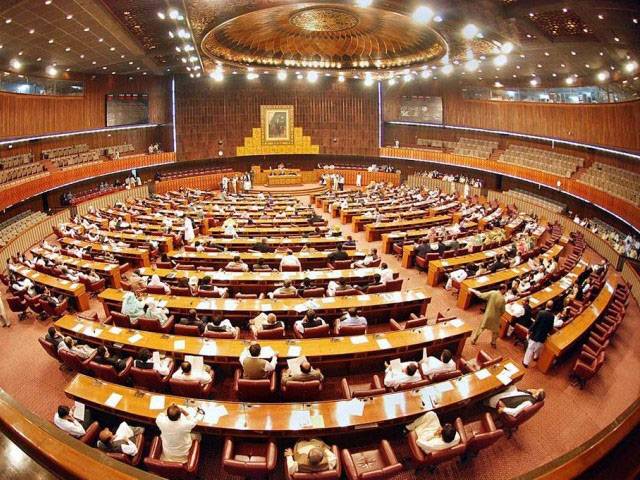ISLAMABAD - As expected, the government on Monday succeeded in getting unanimously passed the controversial Protection of Pakistan (PPB) Bill 2014 that gives sweeping powers to police, armed forces and civil armed forces, from the upper house of the Parliament with a number of amendments proposed by the opposition benches.
The bill that has already been passed by the National Assembly will now go back to the lower house for its final assent. The statement of objects and reasons of the bill says that it provides protection against waging of war or insurrection against Pakistan, prevention of acts threatening the security of Pakistan and for speedy trial of offences.
The bill after becoming an Act shall remain in force for a period of two years from the date it will come into force. The Act should come into force at once in whole of Pakistan. Under the Section 2 of the bill, the enemy alien has been defined a militant whose identity is unascertainable. The word militant has also been defined in the bill.
The Section 3 of PPB says that any police officer not below BS-15 or member of the armed forces or civil armed forces, after giving prior warning and after reasonable apprehension may use force and order firing upon any person or persons who are committing or in all probability likely to commit a scheduled offence. However, the jurdical review had been given in the bill, as proposed by the opposition, and under the same clause, all cases of firing which have resulted in death may, if the facts and circumstances so warrant, be reviewed in a judicial inquiry conducted by a person appointed by the federal government
Under section 3, any police officer not below BS-15 or member of the armed forces or civil armed forces can arrest without warrant any person who has committed a scheduled offence or is likely to commit any such offence. Similarly, they can enter and search, without warrant any premises to make any arrest or to take possession of any fire-arm, weapon, vehicle, article etc likely to be used in the commission of scheduled offence.
The Section 4 says that a special judicial magistrate may remand the accused, arrested or detained, for investigation purposes up to a period of 60 days from time to time but would give orders of judicial remand for a period not exceeding 15 days for one time.
Under Section 6, the government can authorise the detention of a person for a period not exceeding 90 days if the government has reasonable grounds that such a person is acting in a manner prejudicial to the integrity, security, defence of Pakistan or any part thereof or external affairs of Pakistan. The alien enemies or militants would be detained in designated internment centres and the federal government shall make rules to regulate the internment camps, orders, mechanisms for representation against internment orders and judicial oversight of such camps. Under Section 9, the government, joint investigation team, armed forces or civil armed forces, may withhold the information except from high court or Supreme Court, regarding the location of detainee or accused or internment centre.
The Section 8 provides for the establishment of special courts and the government in consultation with the chief justice of the concerned high court, may appoint any person as judge of the special court constituted under this Act who is or has been a session judge in any province of Pakistan or has been an advocate of the high court for a period of less than 10 years, and is not more than seventy years of age. The criterion for the appointment of special judicial magistrates has also been laid down in the bill.
Under Section 15, the burden of proof would lie on an enemy alien or militant unless he establishes his non-involvement in the offence. Under Section 19, an appeal against the final judgement of a special court shall lie to the high court.
Earlier, the chairman of the Senate Standing Committee on Interior Talha Mahmood, presenting the report of PPB, said the committee has approved the bill on merit and hoped that the law would not be misused against seminaries or other segments of the society.
Federal Minister for Science and Technology Zahid Hamid thanked all the parliamentary parties in the House for developing a consensus on the bill. Mian Raza Rabbani objected to the absence of interior minister Chaudhry Nisar Ali Khan what he said that an important bill was being introduced in the house and the interior minister was unwilling to attend in the house.
Friday, April 19, 2024
PPB clears last Senate hurdle

Caption: PPB clears last Senate hurdle
8:18 PM | April 19, 2024
Germany head coach Julian Nagelsmann extends contract till 2026 World Cup
9:00 PM | April 19, 2024
NA speaker suspends two MNAs for disruptive behavior during presidential address
8:20 PM | April 19, 2024
PM Shehbaz orders accelerating countrywide drive against smuggling
8:19 PM | April 19, 2024
LHC allows PTI to hold rally in NA-119
8:18 PM | April 19, 2024
Balochistan cabinet members to be assigned portfolios shortly, says CM Bugti
8:17 PM | April 19, 2024
A Tense Neighbourhood
April 19, 2024
Dubai Underwater
April 19, 2024
X Debate Continues
April 19, 2024
Hepatitis Challenge
April 18, 2024
IMF Predictions
April 18, 2024
Kite tragedy
April 19, 2024
Discipline dilemma
April 19, 2024
Urgent plea
April 19, 2024
Justice denied
April 18, 2024
AI dilemmas unveiled
April 18, 2024
ePaper - Nawaiwaqt
Advertisement
Nawaiwaqt Group | Copyright © 2024





